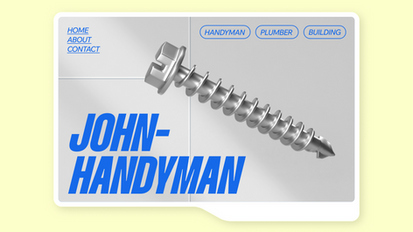Bubble Website Builder Best Practices
Bubble Website Builder FAQ
Bubble Website Builder
In this modern digital age, having a professional and user-friendly website is crucial for any small business looking to attract customers and generate leads. However, hiring a professional web designer can be costly, especially for small businesses with limited budgets. This is where website builders come in handy. Website builders are tools that allow users to create websites without any coding or technical skills. There are many options available, but finding the best free website builder for small businesses can be a daunting task. To help you make an informed decision, we have compiled a list of the top free website builders for small businesses.

Bubble Website Builder in 3 Steps
Bubble Website Builder
What is a website builder?
A website builder is a tool that allows users to create and customize their own websites without needing to know how to code. These platforms typically offer a variety of templates and drag-and-drop tools that make it easy for even those with limited technical skills to create a website that fits their needs.
Inexpensive website builders offer affordable options for those looking to create a website on a budget. While some of these platforms may have limitations in terms of customization and functionality compared to more expensive options, they still provide a cost-effective way to get your website up and running quickly.
Features of inexpensive website builders
While the features offered by inexpensive website builders may vary, there are some common features that you can expect to find across many platforms:
1. Templates: Most website builders offer a selection of pre-designed templates that you can customize to create a unique look for your website. These templates are typically responsive, meaning they will look good on any device, from desktop computers to smartphones.
2. Drag-and-drop tools: One of the key features of website builders is their drag-and-drop functionality, which allows you to easily add and rearrange elements on your website without needing to know how to code.
3. E-commerce capabilities: Many website builders offer built-in e-commerce tools that make it easy to set up an online store and start selling products or services.
4. SEO tools: Some website builders include basic SEO tools that help you optimize your website for search engines, making it easier for potential customers to find you online.
5. Custom domain and hosting: Many website builders offer the option to purchase a custom domain and hosting directly through their platform, making it easy to get your website up and running quickly.
6. Customer support: Most website builders offer customer support to help you troubleshoot any issues or answer any questions you may have while building your website.
Best inexpensive website builders
There are many inexpensive website builders available, each offering different features and pricing options. Here are some of the best options for creating a professional website on a budget:
1. Wix: Wix is a popular website builder that offers a range of pricing plans, including a free option with basic features and paid plans starting at just $14 per month. Wix’s drag-and-drop tools and customizable templates make it easy to create a professional-looking website without any coding knowledge.
2. Weebly: Weebly is another user-friendly website builder that offers a free plan with basic features and paid plans starting at $6 per month. Weebly’s e-commerce tools and responsive templates make it a great option for small businesses looking to sell products online.
3. Squarespace: Squarespace is a visually stunning website builder that offers plans starting at $12 per month. With its modern templates and powerful customization options, Squarespace is a great option for creatives and small businesses looking to make a statement online.
4. WordPress.com: WordPress.com is a popular website builder that offers a free plan with limited features and paid plans starting at $4 per month. While WordPress.com is not as customizable as self-hosted WordPress.org, it still offers plenty of flexibility and functionality for those looking to create a professional website on a budget.
What is responsive web development?
Responsive web development is the practice of designing and building websites in a way that allows them to adjust and adapt to different screen sizes and devices. This means that a website will look and function properly on a desktop computer, a smartphone, a tablet, or any other device with a screen.
There are several key components of responsive web development that make it effective. These include:
1. Flexible grids: One of the main principles of responsive design is the use of flexible grids that can scale proportionally to fit different screen sizes. This allows for a website to maintain its layout and structure regardless of the device it is being viewed on.
2. Media queries: Media queries are CSS3 modules that allow developers to apply different styles based on the size of the screen. By using media queries, developers can create specific styles for different screen sizes, ensuring that a website looks and functions properly on all devices.
3. Fluid images: Another important aspect of responsive design is the use of fluid images, which can scale proportionally to fit different screen sizes. This prevents images from becoming distorted or cut off on smaller screens, ensuring a consistent user experience.
4. Mobile-first approach: With the increasing use of smartphones and tablets, it has become common practice to design websites with a mobile-first approach. This means that developers start by designing the mobile version of a website first, and then adapt it for larger screens. This approach ensures that a website is optimized for mobile devices, which are used by a majority of users.
Benefits of responsive web development
There are several key benefits of responsive web development, which make it essential for modern website design. These include:
1. Improved user experience: Responsive websites provide a seamless user experience across all devices, ensuring that users can easily navigate and interact with a website regardless of the device they are using. This leads to higher user satisfaction and increased engagement.
2. Higher conversion rates: With the increasing use of smartphones for online shopping and browsing, it is essential for e-commerce websites to be responsive. Responsive design ensures that users can easily make purchases and complete transactions on any device, leading to higher conversion rates and increased sales.
3. Better SEO performance: Search engines such as Google prioritize responsive websites in search results, as they provide a better user experience. Responsive design can improve a website’s SEO performance, leading to higher rankings and increased organic traffic.
4. Cost-effective: Responsive web development can be cost-effective in the long run, as it eliminates the need for separate mobile websites or apps. By designing a single responsive website, developers can ensure that the website looks and functions properly on all devices, reducing the need for additional resources and maintenance.
Challenges of responsive web development
While there are numerous benefits to responsive web development, there are also some challenges that developers may face. These include:
1. Compatibility issues: With the wide variety of devices and screen sizes available, developers may encounter compatibility issues when designing a responsive website. It is important to test a website on different devices and browsers to ensure that it looks and functions properly on all platforms.
2. Performance optimization: Responsive websites can be slower to load on mobile devices, especially if they contain high-resolution images or complex features. It is important for developers to optimize the performance of a website to ensure fast loading times and a seamless user experience.
3. Complexity of design: Designing a responsive website can be more complex than designing a traditional website, as developers need to consider how the layout will adapt to different screen sizes. It is important to create a flexible design that can scale proportionally and maintain a consistent user experience across all devices.

Bubble Website Builder Explained
Bubble Website Builder
Conclusion
In conclusion, website ranking checkers are valuable tools that can help businesses track their performance in search engines and improve their online visibility. By monitoring keyword rankings, tracking competitor rankings, identifying SEO issues, measuring the effectiveness of SEO efforts, and improving content strategy, businesses can take proactive steps to boost their website rankings and attract more organic traffic.
If you’re looking to improve your website’s ranking on search engine results pages, consider using a website ranking checker to gain valuable insights and make data-driven decisions to enhance your online presence. With the right tools and strategies in place, you can elevate your website’s performance in search engines and drive more traffic and leads to your business.


